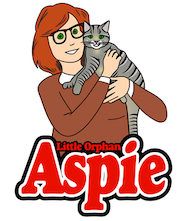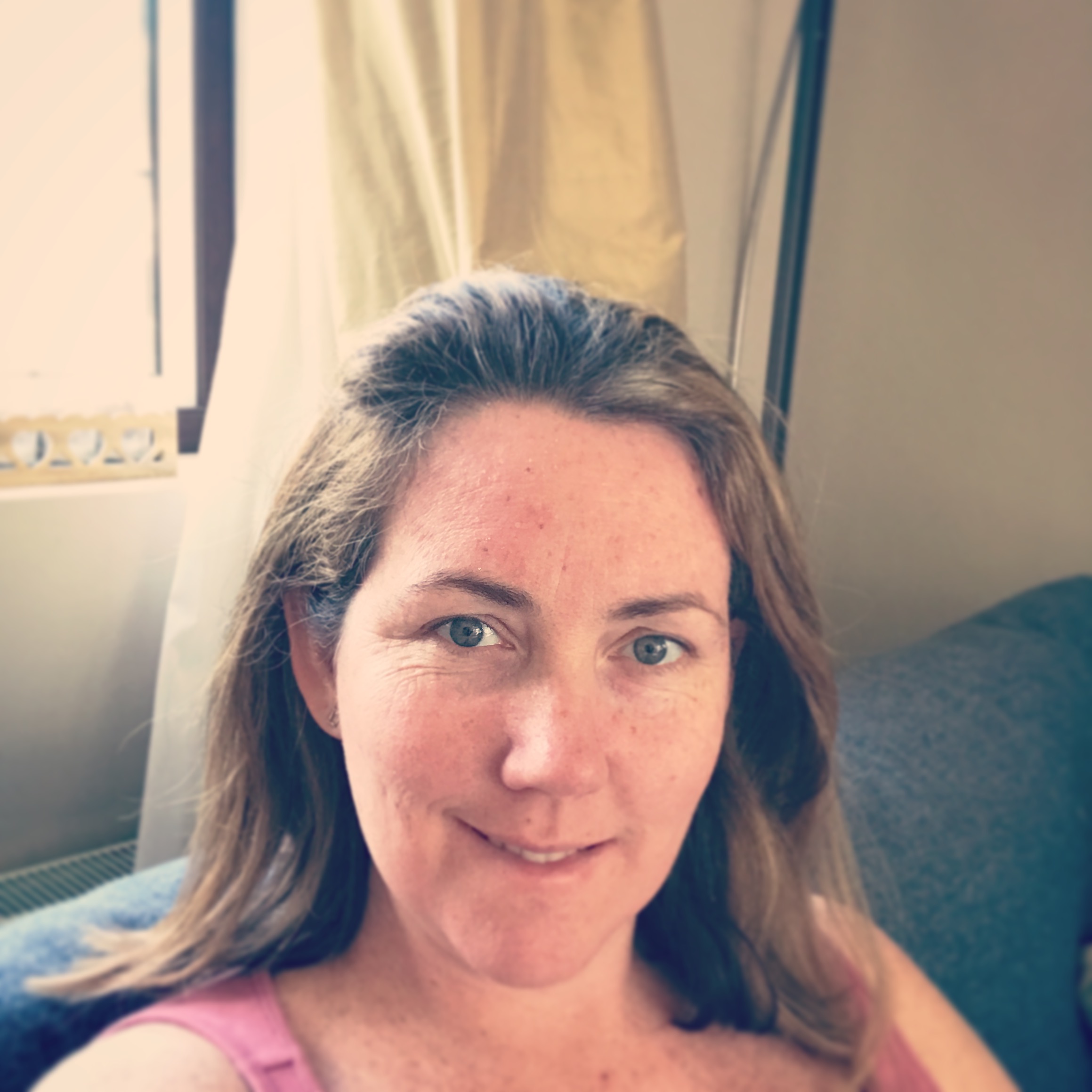REVIEW AND INTERVIEW by Little Orphan Aspie
I Overcame My Autism and All I Got Was This Lousy Anxiety Disorder (2020, published in the UK by IngramContent.com and available from online retailers)
Sarah Kurchak describes herself as “a middle-aged writer with almost no profile.” I guess that makes me a Queenager, being 20 years her senior. She caught my attention in 2018 with an arresting article on Vox.com on reaching and passing the average life expectancy of an autistic adult (36 in that study!) Alternately acerbic and endearing, Sarah’s writing is perfect for these edgy times. I think the book is great as it will help younger women and avoid many of the pitfalls I encountered. She stresses it is more what NOT to do than what TO do.
I Overcame My Autism and All I Got Was This Lousy Anxiety Disorder (hereafter IOMAA—AIGWTLAD) is a refreshing memoir of life as an undiagnosed autistic that touches on PFL (no, not Person First Language, rather Pillow Fight League), 60s TV series, vaccines and much more. When Kurchak interviewed champion kickboxer Jo Redman in 2014 for “Martial Arts and the Autism Spectrum” in Vice Fightland, she stated, “We conducted the interview via e-mail, because people on the autism spectrum aren’t huge fans of talking on the phone.” Sarah and I think alike on this, especially in this era of Skype and Zoom. So far, reviews of IOMAA—AIGWTLAD have been mostly positive.
LOA: The title of your memoir is snarky and, like some autistic people, verbose. What has the reaction to the title been, as so many women/non binary are misdiagnosed with an anxiety disorder?
SK: It’s been mixed. Some people love it for the same reasons that I thought it was amusing. Some hate it —sometimes viscerally so it —and that’s absolutely valid. The issue of “overcoming” autism is just too raw for some people, even in jest. And I 100% respect that. I won’t try to convince any autistic person who doesn’t like the title to look past it, either, because I’m pretty sure the tone of the book probably won’t be comfortable or particularly useful to them. For people who do like the title, though, there’s more where that came from!
One thing that has surprised me are some of the reactions from people who either aren’t disabled themselves or don’t have any meaningful ties to disabled people and disability communities. It turns out that the somewhat snarky way a lot of us deal with notions of “overcoming” our disabilities and inspiration porn hasn’t really reached the majority of them yet. I knew that I’d have to explain to some people that the title was ironic. I didn’t realize that I’d have to explain the joke itself to so many!
I can’t speak to misdiagnosis because I actually do have anxiety. Trying to “manage” my autism has probably exacerbated it, but that’s just an anecdotal observation.
LOA: Sadly, I distinguish between the ‘autistic’ and ‘autism’ community. Do you see your memoir acting as a bridge between the two? Why or why not? In other words, who is the book for?
SK: I wrote the book knowing that it would need to reach non-autistic audiences in order to succeed in terms of both awareness-raising and sales. But in my heart, I wrote it for autistic people. I don’t really consider myself a part of the autism or the autistic community, whatever they are, but I like to think of myself as a friendly satellite who does what she can to support autistic people. I hope this book can help me be that.
LOA: We’re having this written discourse in the middle of the COVID-19 pandemic. How would the memoir be different if you’d written it this summer?
SK: When I was signing with my publisher [Douglas & McIntyre] in early 2019, they knew that they wanted to release the book in an autism awareness month. As the editorial and publishing process takes about a year from when you file the first draft of the manuscript, that meant that I would have to be able to give them an entire draft in a matter of weeks if we wanted to publish in 2020. It was up to me whether I wanted to do that or wait an extra year. I figured I would spend the first part of 2019 writing the book and the rest of the year editing it, and then emerge from my cocoon to celebrate the finished product in 2020. That obviously hasn’t worked out.
But maybe that’s for the best. If I were writing and editing this spring and summer, I think it would be a more defeated book. You know the part where I say “I’m still trying?” I’m not sure I could bring myself to write that now.
LOA: I just read the recent book Divergent Mind by Jenara Nerenberg and she quoted you. This interview will appear primarily in the U.K. What are your plans and hopes for the book there? Anything new on the horizon?
SK: I don’t know if there are any concrete plans for promotion in the UK. I’ll be grateful to any reader who does pick it up, and especially grateful to anyone who likes it enough to recommend it to someone else, as word of mouth is extremely important for a book like mine, especially now. My resources are pretty limited in terms of promotion and outreach.
As for what’s next, I’m not really planning anything new at the moment. Realistically, I’m a middle-aged writer with almost no profile releasing a book in the midst of a pandemic. I don’t know what my future prospects are, or if there will be any at all. In order to protect my far-too-tender heart (and ego), I’m trying not to dream too big or think too far ahead and set myself up for disappointment.
LOA: Is it hard to find a balance between the tragedy paradigm and the “shiny happy aspie” who inspires everyone?
SK: Not really. I live my life in between those two extremes, so it’s relatively easy for me to reproduce that grey area in my work. I’m finding it a little harder to balance who (some) autistic people think someone in my position should be versus who I am. There are a growing number of people who only know me through tweets and essays who feel quite comfortable telling me what they think I should be doing with my platform, and while I genuinely do want to do the best I can for my fellow autistics, I’ve never been just an autism writer or just an autism advocate. And I neither want to — or even know how to — separate and dissect parts of myself for the cause.
LOA: If there were a movie of YOUR life, who would play you?
SK: My go-to answer for this question for the past twenty or so years has been Kirsten Dunst. She looks like a much prettier version of me, and she’s got an almost Liv Ullmann-esque capacity for quietly radiating a lot of deep and unsettling emotions, which would probably be necessary for The Sarah Kurchak Story. But now I’m thinking I should go in a more experimental direction and cast Daisuke Sasaki, who would really capture the inherent sadness and amusing nihilism that run through my life.
LOA: Glad we finally had this chat, Sarah. Hope the book does well internationally.
SK: Thanks.
Part II of this written encounter is available on LittleOrphanAspie.com at
https://littleorphanaspie.com/part-II-of-my-intriguing-sarah-kurchak-interview/
Sarah’s writings have been published in (alphabetically) The A.V. Club, Electric Literature, The Establishment, Fusion, The Guardian, Huffington Post, Refinery 29, The Toronto Star, and most recently and notably, in Time magazine.
For wrestling and martial arts fans, check out her posts on Vice Fightland.

You can find out more about Little Orphan Aspie at http://LittleOrphanAspie.com and follow her on twitter at https://twitter.com/AspieOrphan
If you are interested in sharing your neurodiversity related experiences, insights or stories via Me.Decoded, then please get in touch.


